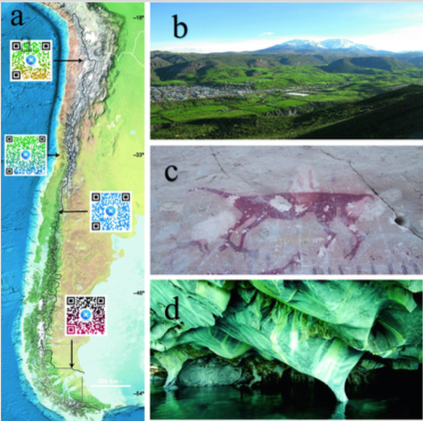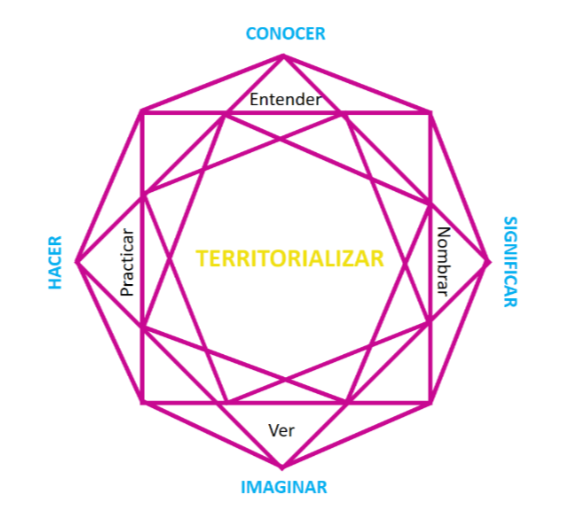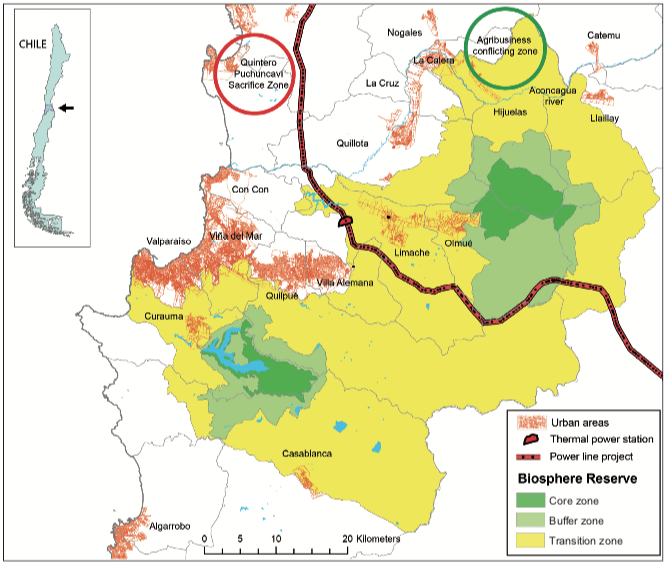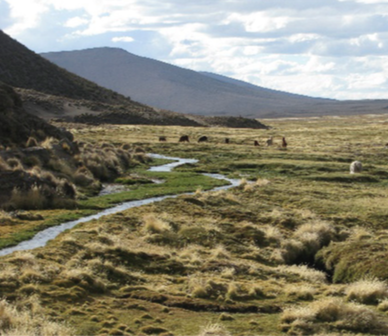Artículos en: Sistemas socio-naturales & Sostenibilidad

Virtual heritage: a model of participatory construction of knowledge towards the Conservation of Biogeocultural Heritage
2019
Virtual heritage has recently received attention as a novel way to better conserve geological heritage sites and values by using advances in digital imaging technology to synthesize, reproduce, represent and display information. Traditionally, there have been difficulties in inventorying, quantifying and consolidating relevant geological heritage sites, especially with regard to limited tools for a proper understanding of their complex nature and multiple connections to other landscape values, including biodiversity, culture values, and the most inclusive concept of biogeocultural heritage.
Pablo Mansilla,
Hermann Manríquez,
Andrés Moreira-Muñoz.

Divergences and Contradictions in the sustainable planning of the periurban rural Metropolitan of Valparaíso
May-October 2019
The concentration of human activities in territories with intense urbanization and lacking territorial planning leads to impacts on natural and semi-natural ecosystems. Faced with this situation, adequate planning of urban growth is necessary in accordance with the sustainable living of the territory. This is relevant in regions with natural and heritage environmental values, and at the same time with a tendency to degradation, spatial fragmentation (agricultural and natural) and socio-environmental segregation. The objective of the work has been to identify the inconsistencies in land use planning, between the regulations that regulate the land uses proposed in the territorial planning instruments (IPTs) and the sustainability criteria that guide the natural and heritage areas proposed in the zoning of the La Campana – Peñuelas Biosphere Reserve.
Francisca Carvajal,
Andrés Moreira-Muñoz,
Alejandro Salazar,
Marcelo Leguía,
Felipe Jorquera Guajardo.

Geography of absences, coloniality of being and territory as a critical noun in the epistemologies of the South
August 2019
The production of geographical knowledge in Latin America is subjected to critical judgment from the perspective of the epistemologies of the South developed by Boaventura de Sousa Santos, generating a dialogue between the sociology of absences and the production of absences in geographical thought. It investigates the spatial dimension of coloniality, proposing to integrate the concept of coloniality of being, and delves into the dichotomies of nature / culture and body / space, present in modern science. Subsequently, in the search for answers to the geography of absences, the emergence of the territory is investigated as a critical noun of contemporary social movements that answers the modern-capitalist-colonial-patriarchal reason of the sciences, disputing spaces for the production of geographic knowledge – indigenous, peasant, Afro-descendant, – which has been commonly denied.
Pablo Mansilla Quiñones,
José Quintero Weir,
Andrés Moreira-Muñoz.

Popular religion and sustainability: improving synergies within the biosphere reserve
July 2019
The potential benefits of integrating vernacular religious beliefs into biodiversity conservation and sustainability actions have been widely emphasized, while specific examples and synergies between religious communities and conservationists in particular settings deserve more attention. The manifestations of vernacular religions in territories dedicated to sustainability, such as the Biosphere Reserves (BR), are a particularly rich area of study. Although La Campana-Peñuelas BR has long been recognized as a territory where local religion is an important characteristic, a greater awareness of this and of the possible link with sustainability actions is still lacking, as well as an awareness of the potential of the BR to become an -Internationally Designated Zone. Here we report on the diversity of popular religious activities within the BR.
Abraham Paulsen,
Danilo Petrovich,
Andrés Moreira-Muñoz.

Regenerative food systems to restore urban-rural relations: perspectives of the food basin of the Concepción Metropolitan Area (Chile)
December 2018
Cities, in recent years, have seen their functional and metabolic relationships with their agrarian interior totally or substantially broken. Within this context, Local Food Systems (LFS) can play a key role in restoring supply relationships under regenerative conditions. assumptions. This article analyzes the EPA within the Concepción Metropolitan Area (CMA) as a representative case of the Metropolitan Areas in Chile. The objective of the article is to evaluate whether EPAs are to regenerate sustainable rural-urban relationships, and to achieve this objective, food basins have been used as a methodological tool to characterize and represent food traceability. For this purpose, three quantitative indicators of food basins and three qualitative spatial analytics have been applied. Regenerative Food Systems (RFS) categories defined to decode EPA behavior in CMA.
Ana Zazo-Moratalla,
Isidora Troncoso-González,
Andrés Moreira-Muñoz.

Towards an Integrated Conservation of the Biogeocultural Landscape of Atacama
December 2018
Landscape and geo-heritage have been positioned as relevant elements both in earth sciences and in those linked to the conservation of biodiversity, landscape and cultural diversity. However, concepts such as valuation, inventory, quantification and consolidation of the relevant sites, from the perspective of geoheritage, are still underdeveloped, at least in Latin America and Chile, because, although there are specific methodologies, they have not yet been applied properly. systematic way. In this work a proposal is made to advance both in the definition of the geoheritage elements of the Atacama macroregion area and in actions towards their consolidation in association with already established figures such as the protected areas belonging to the SNASPE or relevant emerging figures such as that of Biosphere Reserves.
Hermann Manríquez Tirado,
Pablo Mansilla Quiñones,
Andrés Moreira-Muñoz.

Mountain environments in transition: towards a sustainable food system in the Valparaíso Region, Chile
2015-2018
The concentration of human activities in territories with intense urbanization and lacking territorial planning leads to impacts on natural and semi-natural ecosystems. Faced with this situation, adequate planning of urban growth is necessary in accordance with the sustainable living of the territory. This is relevant in regions with natural and heritage environmental values, and at the same time with a tendency to degradation, spatial fragmentation (agricultural and natural) and socio-environmental segregation. The objective of the work has been to identify the inconsistencies in land use planning, between the regulations that regulate the land uses proposed in the territorial planning instruments (IPTs) and the sustainability criteria that guide the natural and heritage areas proposed in the zoning of the La Campana – Peñuelas Biosphere Reserve (BR).
Andrés Moreira-Muñoz,
Marcelo Leguía,
Carlo Sabaini.